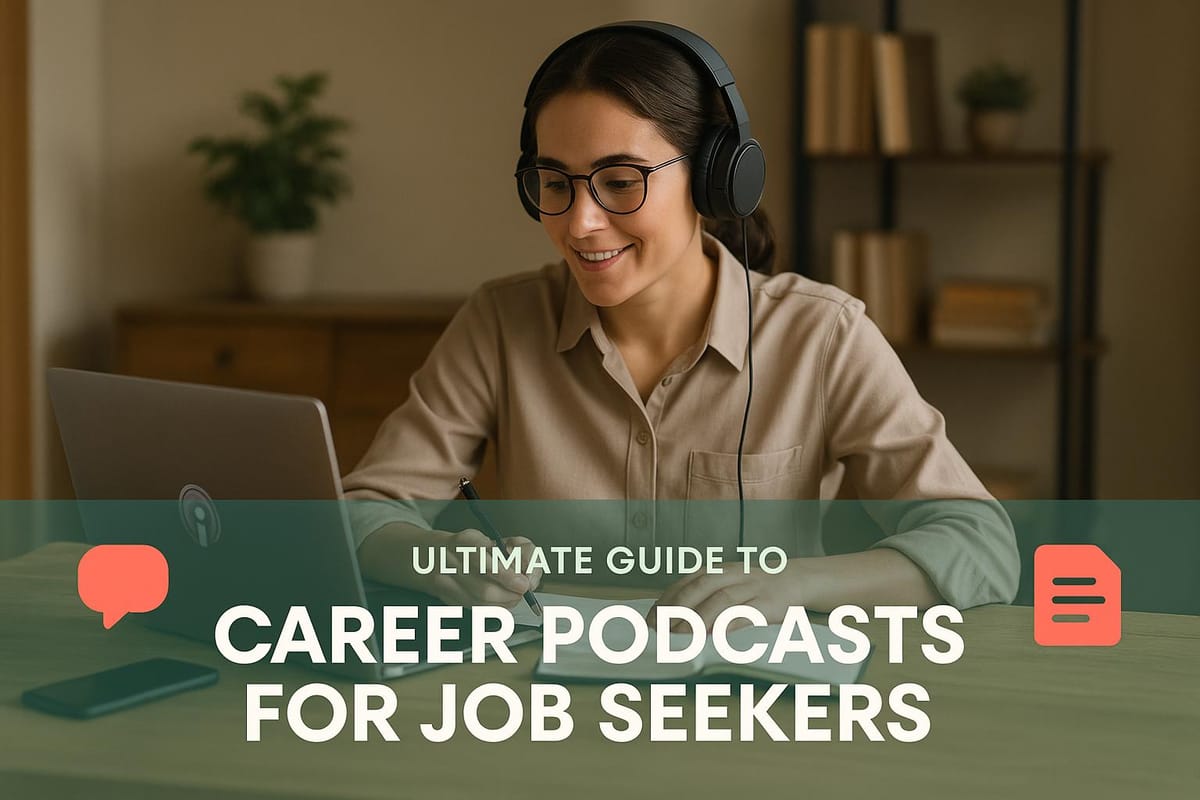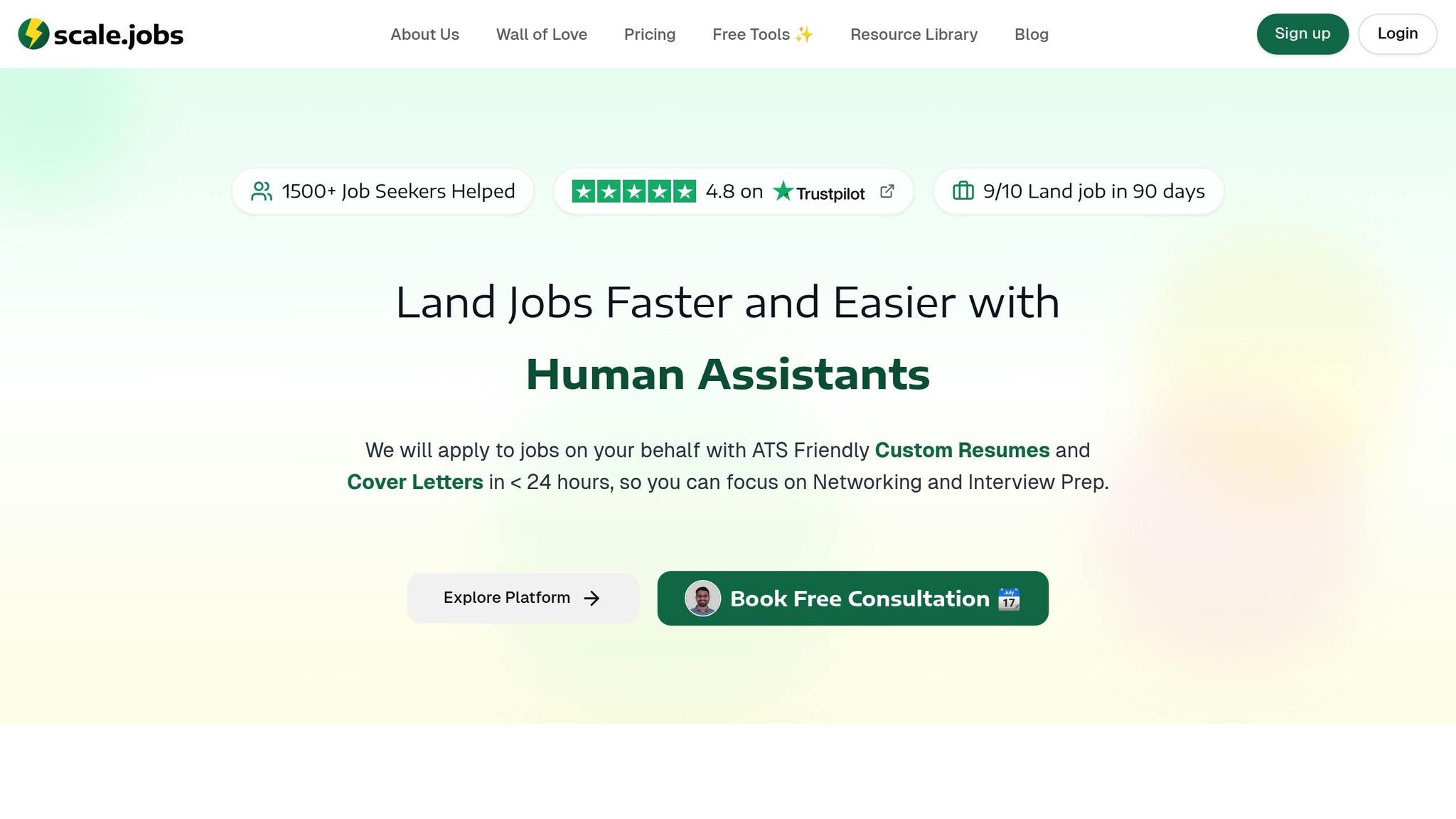Ultimate Guide to Career Podcasts for Job Seekers
Explore top career podcasts that provide job seekers with actionable strategies, expert advice, and insights for navigating the job market.

Looking for practical job search advice? Career podcasts are your secret weapon. They deliver expert tips, success stories, and actionable strategies directly to your ears - perfect for anyone navigating the complexities of today’s job market.
Here’s why they work:
- Timely insights: Podcasts cover the latest hiring trends and strategies.
- Convenience: Listen anytime - while commuting, exercising, or doing chores.
- Expert advice: Hear directly from recruiters, career coaches, and industry leaders.
This guide highlights top career podcasts for different needs - career transitions, skill-building, networking, and more. Plus, learn how to apply podcast insights to improve your resume, cover letter, and interview skills. Pair these tips with tools like Scale.jobs for a seamless job search experience.
Ready to supercharge your job hunt? Let’s dive in.
Key Strategies for Career Transitioning - How To Get a Job Podcast - EP 354
Best Career Development Podcasts
Career podcasts are a great complement to job search platforms like Scale.jobs, offering insights that can help you refine tools like ATS-friendly resumes and interview preparation techniques. Whether you're switching industries entirely or polishing up specific skills, there's a podcast out there for you. These shows bring real-world advice from professionals who’ve navigated career challenges. Below, we’ve outlined podcast categories to match different career development needs.
Career Transition Story Podcasts
If you're facing a major career shift, these podcasts are like a roadmap for navigating the journey. They highlight real success stories from people who’ve reimagined their professional paths. Expect actionable tips like improving your LinkedIn profile, setting up informational interviews, or tackling the financial side of a career change. These podcasts are especially helpful if you're considering a bold move into a new industry or role.
Skill Building Podcasts
Looking to sharpen your skills or learn something new? Skill-building podcasts are all about structured guidance. They often include exercises to evaluate your current abilities and advice on gaining new ones. Many also recommend certifications, online courses, and other resources to keep your skills relevant in today’s fast-changing job market. If staying competitive is your goal, these shows are a must-listen.
Networking and Personal Branding Shows
Networking and personal branding can feel tricky, but these podcasts break it down. They feature insights from recruiters, hiring managers, and career pros on building genuine professional relationships and presenting yourself effectively to employers. You'll also hear about creative strategies like digital engagement and community-building to overcome networking hurdles. When paired with tools like Scale.jobs, these insights can help you craft a strong personal brand that stands out.
How to Apply Podcast Tips to Your Job Search
Career podcasts are a treasure trove of advice that can directly improve your resume, cover letters, and interview techniques. By translating the strategies shared by industry experts into actionable steps, you can significantly enhance your job search efforts. Here’s how you can put podcast insights to work for you.
Using Podcast Advice for Resume and Cover Letter Writing
Podcasts often emphasize the importance of shifting your focus from simply listing qualifications to demonstrating how your experience solves an employer’s problems. This approach transforms your resume and cover letter into more than just documents - they become tools to address the specific challenges outlined in job descriptions.
When writing your cover letter, think of it as a business proposal where you’re the solution. Start by identifying the key needs highlighted in the job posting, then align your skills and experiences as direct solutions. This method moves beyond generic templates and creates applications tailored to the employer’s unique challenges.
Many podcasts highlight the effectiveness of strategies like the "killer headline", which succinctly states your top skill and value, and the "321 Rule", where you list three key strengths, narrow them to two, and emphasize the strongest one. These techniques ensure your most impactful qualifications grab attention right away.
Another popular tip is using the inverted pyramid structure, borrowed from journalism. Lead with your most critical qualifications and follow with supporting details in order of importance. This ensures hiring managers immediately see the value you bring, even if they skim your application.
For those looking to streamline the process, platforms like Scale.jobs offer tools that align perfectly with these podcast-inspired strategies. Their AI Tailored Resume and Cover Letter features allow you to quickly customize application materials for each job, incorporating problem-solving and targeted messaging while saving time on manual edits.
Finally, authenticity matters. Podcasts frequently remind listeners to let their personality shine through. Your cover letter should feel like a professional conversation, not a robotic script. A genuine tone helps build a connection with hiring managers, making your application stand out.
Once your resume and cover letter are polished, you can turn your attention to networking and interview strategies.
Improving Networking and Interview Performance
Podcasts also provide actionable advice for networking and interviews, encouraging listeners to practice and refine these skills. The key is translating what you hear into specific actions that align with your career goals.
One recurring topic is elevator pitch development. Use storytelling techniques from podcasts to craft a 30-second introduction that highlights your background, focus, and goals. Practice until it feels natural and adaptable to different networking situations.
For interviews, many podcasts dive into behavioral questions and the STAR method (Situation, Task, Action, Result). Prepare 5-7 concise stories from your experience that demonstrate your skills and competencies. Practicing these will help you respond confidently during interviews.
Podcasts also stress the value of informational interviews as a networking tool. Reach out to professionals in your target field with thoughtful questions about their career paths and insights. Focus on building genuine relationships rather than immediately asking for job leads.
Another critical tip is the importance of follow-up communication. Whether after a networking event or an interview, send personalized thank-you messages within 24 hours. Reference specific points from your conversation and reiterate your interest. This small step can set you apart from other candidates.
Research is another area where podcasts provide practical advice. Use company research techniques to understand their challenges, recent news, and values. This preparation allows you to ask insightful questions and demonstrate your understanding of the company during interviews.
Platforms like Scale.jobs can further enhance these efforts. Their AI Interview Response feature helps you refine answers to behavioral questions by generating tailored responses based on specific scenarios. You can then personalize these answers to reflect your style. Additionally, Scale.jobs’ networking tools make it easier to track contacts, follow up, and maintain relationships - key components of long-term career success as emphasized by podcasts.
Podcasts vs Job Search Platforms
Career podcasts bring you strategic advice and inspiring stories, while job search platforms handle the nuts and bolts - like optimizing your resume, tracking applications, and submitting them directly to employers. The most successful job seekers don’t choose between the two; they combine the strategic wisdom from podcasts with the practical tools offered by platforms to supercharge their job search.
Scale.jobs vs Competitors: Main Differences

When it comes to job search platforms, Scale.jobs takes a unique approach that sets it apart from the competition. Many platforms focus on just one part of the job search process, but Scale.jobs offers a three-pronged solution: free software tools, AI-powered assistance, and human-led services - all wrapped into one package.
Here’s how Scale.jobs measures up against some key competitors:
- Find My Profession: While Find My Profession earns high marks, it doesn’t offer integrated AI tools for do-it-yourself users. Scale.jobs bridges this gap by combining advanced AI technology with human support, all at accessible pricing.
- LazyApply: LazyApply leans heavily on automation, but Scale.jobs goes further by adding human oversight. Features like real-time WhatsApp updates and proof-of-work screenshots ensure a level of transparency and accountability that automation alone can’t deliver.
- Jobscan: Jobscan specializes in ATS (Applicant Tracking System) resume optimization, but Scale.jobs doesn’t stop there. It not only offers ATS-friendly tools but also provides end-to-end application management, networking features, and personalized human support.
What else makes Scale.jobs stand out? Flat-fee pricing, 24-hour turnaround for custom resumes and cover letters, compatibility with any job portal, and dedicated human assistants who can save you over 20 hours a week. These services are backed by real-time updates, so you’re always in the loop.
For international job seekers, Scale.jobs offers specialized assistance with visa requirements, including H1B, F1, and Canada PR. These are areas where many competitors fall short, but Scale.jobs ensures tailored support for navigating these challenges.
How Podcasts and Platforms Work Together
Scale.jobs doesn’t just compete - it complements. When career podcasts emphasize the importance of tailoring resumes for each job, Scale.jobs steps in with its AI Tailored Resume feature, so you can create customized resumes without spending hours tweaking them yourself. Similarly, if a podcast stresses the need for consistent follow-ups and networking, Scale.jobs provides tools like its job application tracker and networking features to help you stay on top of these tasks.
Interview prep is another area where podcasts and Scale.jobs make the perfect team. After listening to an episode on behavioral interview techniques, you can use Scale.jobs’ AI Interview Response tool to practice and refine your answers. It helps you structure responses while incorporating the storytelling methods career experts recommend.
In short, podcasts give you the strategy, and Scale.jobs delivers the execution. Features like real-time updates and proof-of-work screenshots align perfectly with podcast advice on staying organized and accountable during your job search. Together, they create a powerful combination for anyone navigating today’s competitive job market.
Getting the Most from Career Podcasts
Main Points for Job Seekers
Career podcasts are a treasure trove of advice, motivation, and insider knowledge. Shows like The Career Warrior Podcast and Career Cloud dive deep into topics like resume optimization, while How I Got Hired shares real-life networking success stories that you can emulate in your own job search.
The key is to act on what you learn right away. For example, if a podcast highlights the importance of tailoring your resume, you can use tools like Scale.jobs' ATS Resume Builder to create resumes that pass applicant tracking systems (ATS). When No B.S. Job Search Advice Radio stresses the need for ATS-friendly resumes, you can immediately put that advice into practice.
Top podcasts also emphasize the importance of learning from setbacks and staying updated on industry trends. But let’s be clear: motivation alone won’t secure interviews. You need systems in place to track applications, follow up regularly, and keep your search organized and focused.
The most effective job seekers treat podcasts as a strategic resource while leveraging tools like Scale.jobs for execution. For example, if a podcast expert discusses the value of personalized cover letters, Scale.jobs' AI assistant can help you create tailored versions for each application in seconds. This approach not only saves time but ensures you're implementing expert advice effectively.
By blending podcast insights with practical tools, you can turn ideas into immediate action - and results.
Next Steps for Your Job Search
Now that you’re armed with these insights, it’s time to take action. Combining podcast advice with Scale.jobs' tools is a powerful way to maximize your job search efforts.
Start by subscribing to 3–5 career podcasts that align with your current career stage. Listen during your commute or daily routine to stay motivated and informed about hiring trends without disrupting your application schedule.
Put what you learn into action using Scale.jobs' free tools. For instance, the job application tracker helps you stay organized and follow up consistently, just as podcast experts recommend.
If you’re looking to save time for networking and interview preparation, Scale.jobs offers human assistant services. These reverse recruiters can handle application submissions across multiple job portals, providing real-time updates and proof-of-work screenshots via WhatsApp for full transparency.
International job seekers dealing with visa challenges (like H1B, F1, or Canada PR) can benefit even more from this combination. While podcasts provide general strategies and motivation, Scale.jobs' human assistants specialize in navigating the unique requirements of visa-dependent applications, giving you an edge in a competitive job market.
Here’s the winning approach: let career podcasts inspire your strategy, and use Scale.jobs to execute it efficiently. Start with free tools like the salary predictor and interview questions generator, then explore AI and human assistant features as your search progresses. This system turns inspiration into tangible results, bringing you closer to landing your next role.
FAQs
How can I use insights from career podcasts to improve my job search?
Career Podcasts: A Job Search Goldmine
Career podcasts offer a treasure trove of practical advice for navigating your job search. Dive into episodes that cover essential topics like networking, polishing your resume, and preparing for interviews. Jot down actionable tips from career experts and put them to work. For instance, you might tweak your resume to emphasize transferable skills or rehearse answers to common interview questions.
Make these insights part of your daily routine. Dedicate time to networking, tailoring your applications, or digging into company research. Revisiting podcast episodes can also keep you up-to-date on shifts in the job market, helping you fine-tune your strategy. By staying consistent, these podcasts can become a powerful tool to set you apart in your job search.
What are some great career podcasts for people looking to change industries?
If you're thinking about changing industries, there are some fantastic career podcasts that can help guide you with inspiration and practical advice. The Career Switch Podcast dives into real-life stories of people who’ve successfully moved into new fields, sharing relatable experiences and plenty of motivation. Another solid choice is The Career Change Podcast, which focuses on actionable strategies for tackling career transitions or launching a fresh business venture. Both podcasts are excellent resources for anyone ready to take a leap in their professional journey.
How can career podcasts and tools like Scale.jobs work together to improve your job search?
Career podcasts and platforms like Scale.jobs work together to enhance the job search journey. Podcasts deliver actionable tips on essential topics like developing transferable skills, effective networking, and acing interviews, helping job seekers feel more confident and focused.
On the other hand, Scale.jobs steps in with practical tools and services to simplify the application process. These include ATS-friendly resumes, customized cover letters, and even hands-on support. By pairing the insights from podcasts with the tailored resources of Scale.jobs, job seekers can tackle their search with greater efficiency and accuracy, saving valuable time while increasing their chances of landing the right role.




